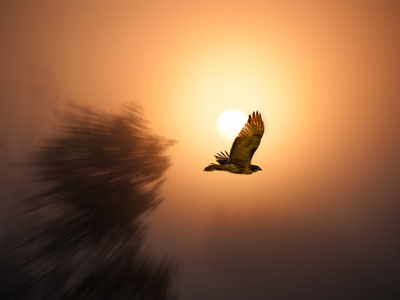
Poetry - Hawk Roosting
This English Language quiz is called 'Poetry - Hawk Roosting' and it has been written by teachers to help you if you are studying the subject at high school. Playing educational quizzes is a user-friendly way to learn if you are in the 9th or 10th grade - aged 14 to 16.
It costs only $12.50 per month to play this quiz and over 3,500 others that help you with your school work. You can subscribe on the page at Join Us
Ted Hughes was a twentieth-century English poet. His work was highly-regarded: he received many awards and much praise for his poetry during his lifetime, and was made Poet Laureate in 1984. Much of his earlier poetry explores the natural world, focussing on its primal, non-romanticised essence. This poem, 'Hawk Roosting', is a good example.
Read the poem slowly, then test your analytical skills with this quiz.
Hawk Roosting
I sit in the top of the wood, my eyes closed.
Inaction, no falsifying dream
Between my hooked head and hooked feet:
Or in sleep rehearse perfect kills and eat.
The convenience of the high trees!
The air's buoyancy and the sun's ray
Are of advantage to me;
And the earth's face upward for my inspection.
My feet are locked upon the rough bark.
It took the whole of Creation
To produce my foot, my each feather:
Now I hold Creation in my foot
Or fly up, and revolve it all slowly -
I kill where I please because it is all mine.
There is no sophistry in my body:
My manners are tearing off heads -
The allotment of death.
For the one path of my flight is direct
Through the bones of the living.
No arguments assert my right:
The sun is behind me.
Nothing has changed since I began.
My eye has permitted no change.
I am going to keep things like this.
Ted Hughes
Ready for more?
not all...
quizzers. Try to win a coveted spot on our Hall of Fame Page.







